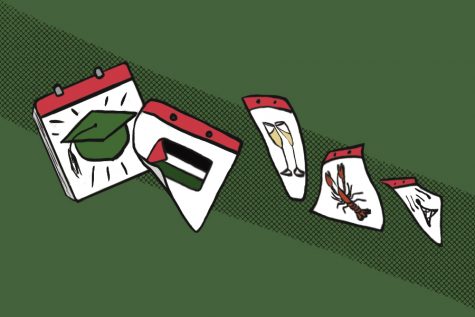Heartbreak, coronavirus, and the best people I’ve ever known
April 7, 2020
Today, almost three weeks after Tulane’s initial announcement of transitioning academic instruction online, I decided to take a walk through campus. I was met with a chilling sadness as I passed through McAlister Place, eyeing the remaining pavement chalk of planned events that will never happen.
Just a few weeks ago, lively and unwary students were filtering in and out of buildings that are now locked, closed off with security guards standing close by. Posters plaster classroom windows instructing our community to maintain social distance. My heart is heavy as I reach Gibson Hall, the end of my campus walk. I look out across the Academic Quad, and there is not a single person in sight.
These days have felt like weeks and these weeks have felt like months and the moments we were hoping that would last the longest have slipped away from us the quickest. This has been no easy time for any of us. I remember the waves of devastation that hit my peers as they grappled with the coronavirus pandemic.
I sat close to my roommates as they mourned the end of months and months of work – planning the WTUL 50th anniversary marathon, the most legendary Crawfest ever expected, an epic Tulane Palestine week – all gone now, stolen with little warning. My best friend called me in tears. She would have to say goodbye to her secret college boyfriend and return to the strict Brown parents who refused to let her speak to him. A freshman I knew was just starting to feel the symptoms of his depression less and less and now is forced into an immediate confrontation with the place where it all began.

Sunday was the most stunning day for me. Within hours, I lost both my Mid-City server job and post-grad offer. I didn’t want to leave my house and say goodbye to anyone; I didn’t want to bring this experience to reality at all.
The week following Tulane’s announcement was the most difficult. Each hour was characterized by the most atypical kind of uncertainty. Day by day, different friends announced their abrupt decisions to leave New Orleans. Plans that looked like the entire senior class riding out their final semester in the city quickly shifted to lonelier and quieter days until soon, the only people I saw were the people that I lived with.
Any attempt at ceremony was distasteful. A drink at The Boot could have meant infection for weeks. The promised goodbye banquets and senior traditions, moments that were years in the making, could not be the special occasions of closure we had hoped for, but were actually deeply serious public health risks.
It was a cruel irony. Our efforts to commemorate one another would certainly increase our potential to hurt one another. Before we knew it, people were gone. All the things left unsaid still linger on my tongue. In my free time, I fantasize about what could have been but then quickly return to worrying about what actually is.
It all just feels like a really bad breakup. Students were ripped away from the promise of lasting final memories, blocked from returning to campus, and told to pack up their things and go. The hurt still stings like an untreated wound. My mind keeps racing, wondering if I did everything that I could have and if I had known it would be like this, is there anything I would have done differently?
I keep coming back to the people. Yes, I am upset about the events that I won’t get to attend, but it’s the rushed and absent goodbyes that hurt the most. I had plans, we all had plans or at least ideas of plans about how our farewells would be, some part of a goodbye that we had control over. But now we don’t. We are literally in the middle of a pandemic. Instead of a farewell, it was an ‘I hope you stay alive.’
There was no real closure. Our community and our university can try to do everything they can to give us some virtual feeling of a senior spring sendoff, but the hurt continues because it is not the lifelong planned expectations for a college graduation.
I don’t want to look for the silver linings. I didn’t want my senior spring to have to turn into something that made me stronger, something I talk about in job interviews, something I laugh about years from now. I just wanted it to be a little close to the farewell I had been looking forward to for 21 years.
It is always these things that we don’t have any control over that make us feel the most pain. I like to think that I have acquired skills to cope with the heavy things in life that are simply out of my control. Reacting to systems of racism, homophobia and xenophobia, I look at the things that hurt me, take time to feel the fullest extent of that suffering, and attempt to transform it into some higher pursuit of good, maybe activism. Yet, as I look this pandemic in the face and feel all the pain from the things that it has taken away from me, I struggle to turn it into any good at all.
It wasn’t until a close friend of mine shared an interview with David Kessler, an expert on human reaction to loss, that I was able to fully realize that much of my internal distress surrounding coronavirus was actually a feeling of grief. Three weeks ago, there was a whole future and world ahead of me that I was dead set on living through. Now, it’s gone, or at least uncertain, and what I am really left with is grief.
And grief requires grieving. Unfortunately, this is a bitterly long process. I find that there is no way to truly move onto the next stage of my life without feeling and interrogating the sadness that has resulted from this pandemic.
As mere young adults, this seems like one of the most challenging things we will have to do. Every day I wake up and try to think about life in a new way that makes me feel better. It’s like trying on different hats until one feels right, just looking for that perspective that fits just right enough to keep me going forward.
This is much of why I think of the effects of the coronavirus pandemic like heartbreak. I am imagining the entire senior class getting dumped by Tulane all on the same day. It sucks. We don’t get our closure, and we didn’t do anything to deserve it. Instead, we have our string of broken hearts, wishing things hadn’t gone the way that they did. But like the pain of all bad breakups, I know this too shall pass.
Having decided to stay in New Orleans indefinitely, I still walk through campus almost every single day. It is nothing like I have ever seen it before, but on my walks, it feels good to touch a piece of Tulane that makes me happy — the grass on Newcomb Quad, my freshmen dorm, the benches outside of Jones Hall — and remember great times that still would have been great even if I had known my college career would end in an international pandemic.
I have found that life is chock full of things we cannot control – more often those than the ones we can – and that I can’t always make an enemy of the things that hurt me. But it is from the things that hurt me that I am able to find the things that make me the most happy.










Kennon Stewart • Apr 17, 2020 at 2:00 pm
An amazing last article for one of the incomparable voice of Tulane. I’ll miss his thoughts and succinct commentary
Lee Medina • Apr 11, 2020 at 11:13 am
It truly is a heartbreaking and grief-filled time, beautifully expressed.